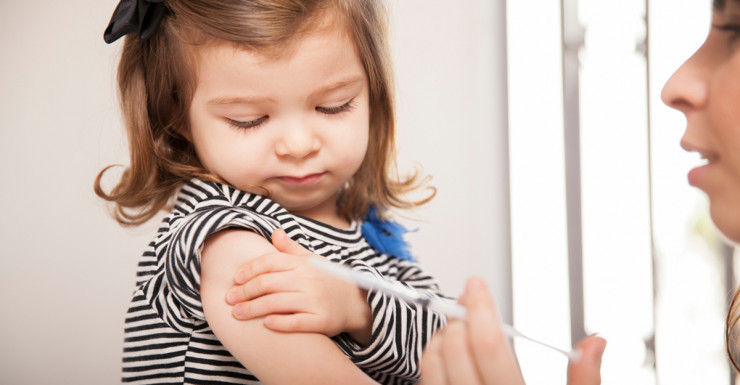Yes, Your Family Has to Get Flu Shots This Year. Here's Why.
So flu season is almost upon us. (Wait, weren't we like just at the beach?) That means it's that time of year again for you and your brood to arm yourself with an ingenious little invention called the flu vaccine. If you happen to be one of many Americans who chose the flu mist (a painless nasal spray) over the shot (the ouchy needle kind), well, 1. We get it. And 2. You're out of luck this year. Turns out the CDC has deemed the mist ineffective for actually preventing the virus and is recommending everybody go with the shot this year. That means, as with anything related to the angst-inducing topic of our kids' health, we've got lots of questions.
For answers, we turned to Ashwin Jathavedam, MD, chief of infectious disease at Englewood Hospital and Medical Center, who shared what the new CDC protocol means, if we should be worried if our kids got the mist before and what we can do beyond the vaccine to make sure the flu stays far, far away.
When is typically a good time for children and adults to receive the flu vaccination and at what age should kids receive it?
The influenza vaccine is suggested for anyone 6 months of age and older. I generally suggest receiving it in September or October to get maximum coverage for the entire flu season, which typically runs from October to April.
What are the benefits of receiving the flu vaccination? Are there any cons?
The primary benefits are to reduce the risk of influenza and to limit the spread to others who may be at greater risk of serious illness if they fall sick. This would include the elderly, people with heart or lung disease, and people requiring immunosuppressive medications. There are few downsides to vaccination. Anyone with allergies to components of the vaccine should not receive the vaccine.
In past years, parents could choose either a flu mist or a flu shot for their child but we heard this year the flu mist will not be available. Can you provide information as to why the CDC decided to discontinue this popular option? And if it is simply because it is no longer effective, what causes it to be no longer effective? Was it ever effective in the past?
The CDC made the decision to stop recommending the flu mist as review of data from the 2011 to 2015 flu seasons showed very limited benefit versus the inactivated vaccine. There are many theories as to what caused this, but the exact reasons are not yet clear. Data from other countries still suggests effectiveness; so there may be a role for return of the flu mist in the future.
If the flu mist does come back in the future, can parents trust that it will be effective?
Yes. Influenza is a moving target and that means we have to continuously adjust our approach to combating it.
If children received the flu mist in the past, do parents need to be concerned about it leading to any future health issues? Will children who have previously received the flu mist have any negative side effects from receiving the flu shot this year?
There is no evidence of health issues linked to receipt of flu mist in the past. Children who received flu mist in the past may receive the regular flu shot without any additional risks.
How effective is the flu shot?
Traditionally the flu shot is 50 to 70 percent effective against preventing the flu. Data for this upcoming season will be available in the winter once flu season is underway.
Is it possible for children and adults to get the flu even if they receive a flu shot?
Unfortunately it is possible to still get the flu even if one gets the vaccine. However, the risk is reduced and vaccine recipients tend to have a milder course of illness.
How can you tell the difference between the flu versus just having a bad cold? What are some of the symptoms and what is the best way to treat the flu if you get it?
Compared to the common cold, the flu tends to cause higher degrees of fever and systemic
symptoms such as body aches and fatigue. If identified early, there are medications available to hasten resolution of the illness.
What is the best prevention?
In addition to the vaccination, the best methods of prevention are to instruct children on proper hand washing and the proper way to cover their mouths if coughing and sneezing. In addition, children should be kept home if ill to limit spread to others.






